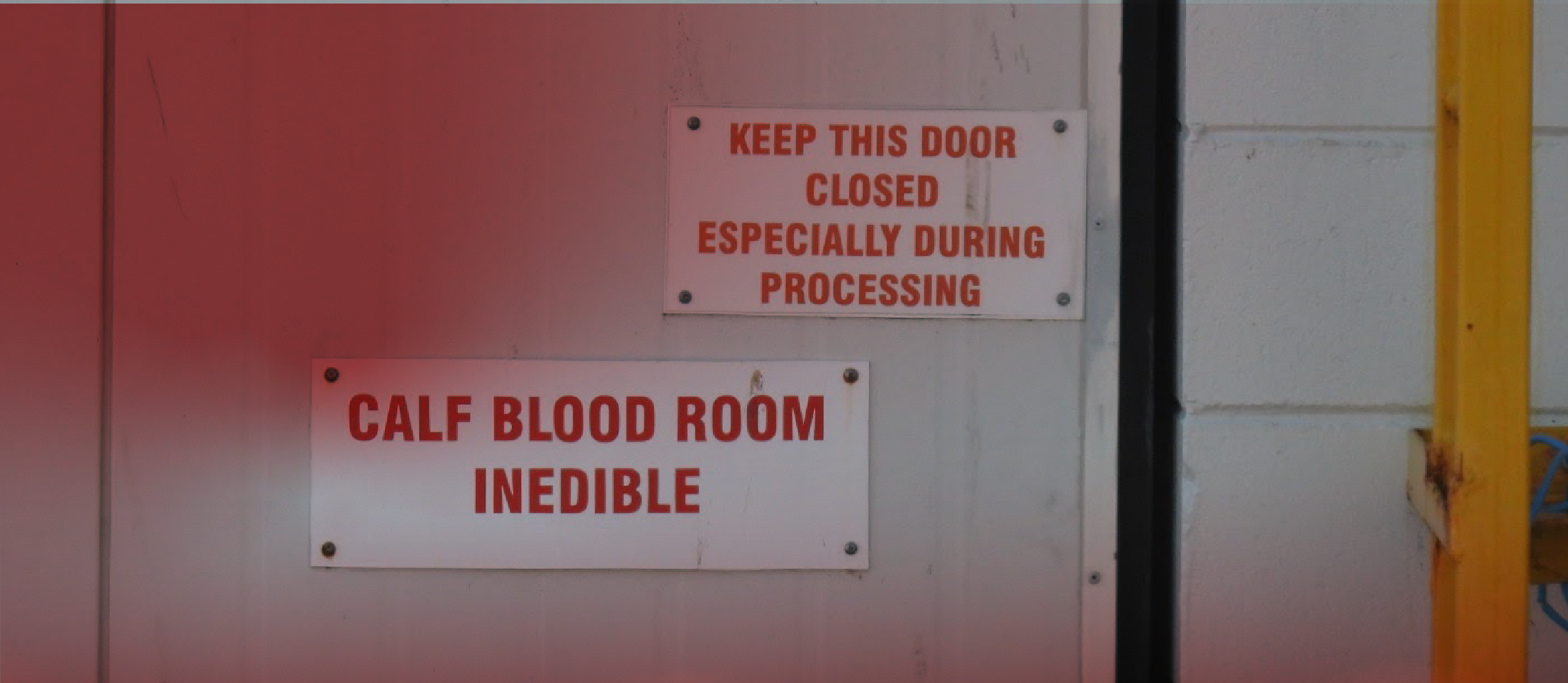
Foetal Bovine Serum: Your Questions Answered
September 15th, 2022Behind slaughterhouse doors, mother cows are being killed during pregnancy with the blood from their unborn calves drained to produce foetal bovine serum (FBS). The meat and dairy industries want to grow the market for foetal calf blood to capitalise on its value, and the serum industry claims that FBS is fundamental for advancing human health.
SAFE Campaigns Officer Emma Brodie debunks claims around the importance of FBS and explains why we must advocate on behalf of animals who are suffering in this industry.
What is foetal bovine serum?
Foetal bovine serum is used as a growth supplement in cell culture. It supports the survival and expansion of cells in the development of some vaccines and lab-grown meats, as well as in stem-cell research and biotechnology. The blood of unborn calves is spun down to produce the serum, which involves killing cows in the later stages of pregnancy.
ANZCO Foods is a leading driver of this industry in Aotearoa. It owns Bovogen Biologicals which sources foetal blood from ANZCO slaughter facilities across the country. Most FBS manufactured in New Zealand is exported overseas. In 2021, we exported around 35,000 litres and 33,000 kilograms of FBS (MPI allows businesses to choose which unit of measurement to record), which equates to over 100,000 mother cows and calves killed.[1]
Sounds important for medical research?
While FBS is still used for medical research and pharmaceuticals – it doesn’t have to be. In fact, there are both ethical and scientific reasons why the use of FBS should be phased out.
In general, animal serums are poorly defined substances that can vary between batches and present biosafety risks. FBS has played a role in the spread of mycoplasma – a bacterium that can cause infections in both animals and humans.[2] Animal-free substitutes, such as human-derived alternatives and serum-free media, have been shown to outperform FBS both in terms of the rate at which cells can grow, as well as how reliable each batch can be.[3] This means that animal-free alternatives can yield safer, more predictable outcomes.
Animals do not need to suffer for human health and progress. Animal-free alternatives not only remove suffering from the supply chain, but they contain all the necessary attributes for successful cell culture.
Should we avoid vaccines that contain FBS?
FBS is still used to produce some human vaccines. It is added to the growth medium in which vaccines are studied and developed.
While SAFE is opposed to the use of animal-derived materials, we encourage people to follow the advice of medical professionals and utilise health measures, including vaccines and medicines. Sadly, there are no cruelty-free pharmaceutical products. Unlike cosmetics, medicines and vaccines – even if they do not contain animal products – are still legally required to be tested on animals.
This system is inherently flawed and while we work towards a world free of animal testing and animal-based serums, it is not safe to boycott medicines or vaccines. Remember, you can advocate for an end to animal exploitation and use life-saving medical treatments.
What are the alternatives to FBS?
There are several options for replacing FBS in cell culture. One of the most promising alternatives to FBS is human platelet-lysate (hPL). Derived from human donors, hPL has been shown to perform more effectively than FBS for long-term cell expansion and viability.[4] HPL has the added benefit of creating a culture environment that more closely resembles that of the human body.
Experts at Utrecht University in the Netherlands, in collaboration with Animal Free Research UK, have developed the Fetal Calf Serum-Free database which provides an overview of the commercially available FBS alternatives, and collates the relevant scientific literature. The database can be found here.
How is FBS production unethical if the mother cow is killed first?
Many of the cows killed for FBS production have already been pushed to their physical and emotional limits by the dairy industry. They have suffered through an ongoing cycle of impregnation, birth, separation from their newborn calves and intensive milking, then artificially inseminated one final time before slaughter.
During transport, these cows are at a greater risk of suffering from heat stress, dehydration, injury and early delivery. In 2021, 72 cows (that we know of) gave birth on slaughterhouse floors.[5] This tells us that mother cows are being subjected to unnecessary trauma in their final moments.
Regardless of their age or stage in life, mother cows deserve to be treated with dignity.
SAFE is calling for a ban on the commercial slaughter of pregnant cows in Aotearoa to ensure that New Zealand is actively pursuing a future that removes suffering from the supply chain.
References
[1] Estimate calculated from export data obtained from the Ministry for Primary Industries under the Official Information Act 1982.
[2] Gstraunthaler, G., Lindl, T., & van der Valk, J. (2013). A plea to reduce or replace fetal bovine serum in cell culture media. Cytotechnology, 65(5), 791–793. doi: 10.1007/s10616-013-9633-8
[3] van der Valk, J., Bieback, K., Buta, C., Cochrane, B., Dirks, W. G., Fu, J., Hickman, J. J., Hohensee, C., Kolar, R., Liebsch, M., Pistollato, F., Schulz, M., Thieme, D., Weber, T., Wiest, J., Winkler, S., & Gstraunthaler, G. (2018). Fetal Bovine Serum (FBS): Past-Present-Future. ALTEX: Alternatives to Animal Experimentation, 35(1), 99 – 118. https://doi.org/10.14573/altex.1705101
[4] Dessels, C., Potgieter, M., & Pepper, M.S. (2016). Making the Switch: Alternatives to Fetal Bovine Serum for Adipose-Derived Stromal Cell. Frontiers in Cell and Developmental Biology, 4(115). doi: 10.3389/fcell.2016.00115
[5] Data obtained from the Ministry of Primary Industries under the Official Information Act 1982.
